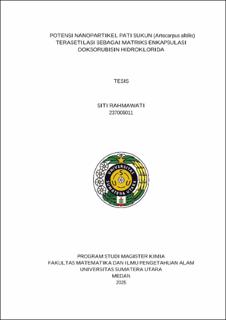| dc.description.abstract | Breadfruit starch (Artocarpus altilis) is a natural biopolymer with promising potential as a matrix for drug encapsulation. This study aimed to synthesize and chemically modify breadfruit starch nanoparticles via acid hydrolysis and acetylation, and to evaluate their physicochemical characteristics and loading capacity for doxorubicin hydrochloride (DOX). Acid hydrolysis using 2.2 N HCl for 6 hours produced nanoparticles with an average diameter of 181 nm, while acetylation yielded particles of 585 nm with a degree of substitution of 0.056. The FTIR spectrum displayed a carbonyl absorption band at 1736 cm⁻¹, confirming successful acetyl group incorporation. Differential Scanning Calorimetry (DSC) revealed shifts in gelatinization temperatures: T₀, Tₚ, and Tc increased from 76.85°C, 99.36°C, and 118.57°C (native starch) to 97.18°C, 109.77°C, and 123.70°C (nanoparticles), and further to 96.59°C, 105.99°C, and 127.42°C (acetylated nanoparticles). SEM analysis showed that native starch granules were polygonal to oval with rough surfaces. After hydrolysis, particles appeared more spherical with smoother surfaces, while acetylated nanoparticles exhibited irregular morphologies with slightly coarse textures. Viscosity decreased from 1.0273 cP (native starch) to 0.9426 cP (nanoparticles) and 0.9288 cP (acetylated), accompanied by increased solubility and reduced swelling power. Drug encapsulation studies revealed that acetylated nanoparticles had the highest drug loading content (53.93 mg/g) and efficiency (80.90%), outperforming both nanoparticles (52.84 mg/g; 79.26%) and native starch (51.27 mg/g; 76.90%). These findings indicate that acetylation enhances the affinity between the nanoparticle matrix and DOX, thereby improving drug loading performance. Overall, acetylated breadfruit starch nanoparticles offer significant potential as a sustainable, biocompatible, and effective carrier for chemotherapeutic drug delivery. | en_US |


